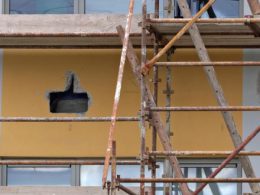“It is an unpalatable fact, in light of the severity of the crisis, that repossessions must be expected to rise significantly.” These were the chilling words uttered by the Deputy Governor of the Central Bank, Matthew Elderfield. He wasn’t speaking about luxury cars that some people may have bought and couldn’t keep up their repayments when their wages were cut or they lost their jobs. He was talking about people’s homes, the roof over their heads, the refuge where they and their families find respite when everything else – income, jobs, their children’s welfare – might be crashing around them due to the economic crisis.
Chilling words for the 71,000 home owners whose mortgages are over three months in arrears but positively terrifying for the 23,500 who are in arrears for two years or more. And an uncomfortable reminder for the 42,000 whose mortgages have already been restructured, that the fates or the crisis better not throw them again into difficulties.
This is the ugly face of capitalism in the Ireland of 2013. A total of 136,000 homeowners in hardship of one form or another as a result of the rampant profiteering by speculators in building land and housing during the property bubble. They are not ‘investors’ who purchased three or six houses to try and make a financial killing on the need of others for shelter when very high levels of employment and inward bound workers intensified demand. They are homeowners living in their homes which are now under threat.
The government proposes to bring in legislation very shortly to close a loophole in the law that doesn’t allow many home repossessions. The Minister for Finance says it is essential that banks have the right to secure repossessions as otherwise ‘the mortgage market would not function properly.’ He has just agreed also that the prohibition on banks calling customers in mortgage distress more than three times a month be removed. All this amounts to a declaration of open season by the banks on those who are in trouble with their mortgages.
A new species of homeowner has recently been discovered by mortgage providers and their agents. Its members are called ‘strategic defaulters’. They are people who allegedly could afford to pay their high mortgages but choose not to in the hope of a debt write off in the future. Like an invasion of foreign plants or mammals, their detractors say they are increasing rapidly and that entertaining them would not be fair to the common or garden variety of homeowner who is making inordinate sacrifices to service unsustainable mortgages. This is largely an imaginary species of course, but a very handy one to give the government and the banks the excuse for refusing to implement a general write down of house prices from the insane levels charged during the property bubble.
Just how difficult it is to be a ‘strategic defaulter’ was illustrated in an RTE Prime Time programme. A small businessman, George Mordaunt, who got into financial difficulty, told interviewer Pat Kenny about his experience. Bound to ‘non disclosure’ by an agreement with the bank, he could nevertheless say that it was ‘painful and intrusive’. ‘I would probably have to prove that I’ve disconnected my Sky TV and not only will I have to disconnect but I probably have to prove continued disconnection for quite some time.’
Referring to some 40 homeowners in mortgage distress whom he has advised over the past period, Mr Mordaunt said, “the family home on every occasion forms part of the discussion, if not the cornerstone… you may end up retaining that house… or you may very well end up having to move out but the house is where the discussion is going to start and its very painful for people.” It doesn’t look much like fertile ground for “strategic defaulters”!
Government policy with regard to the mortgage crisis is a repeat of the disastrous Troika / bailout / austerity regime imposed over the past years. Distressed mortgage homeowners’ fate is to be decided by the banks. The same banks that, driven by lust for endless profits, were instrumental in entrapping them in massive mortgages of up to forty years duration.
The solution is basically simple. The total mortgage on homes should be written down to today’s value. The monthly payments should be calibrated downward accordingly thus releasing hundreds of millions into the domestic economy, thereby stimulating demand for goods and services. To do this the financial institutions should be taken into public ownership, not as at present to prop up the system, but under democratic control and management as part of a wider economic transformation of society where the economy is run for the needs of the majority rather than being a funnel for more profits to the sharks in the financial markets.












